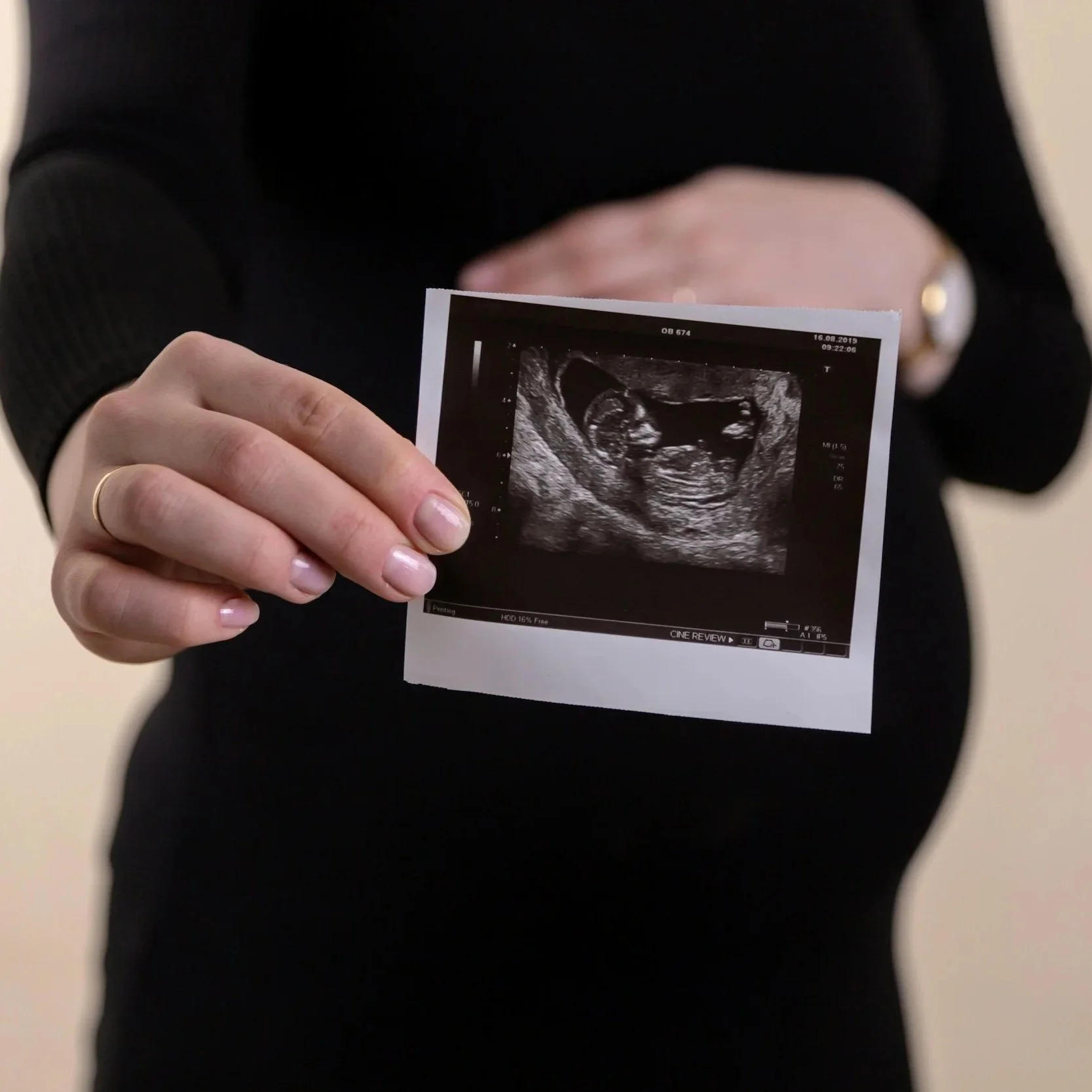Rebuilding Trust with Your Body After Pregnancy Loss
TL;DR: Pregnancy loss doesn’t only impact emotions—it often leaves people feeling disconnected from their bodies. Many describe a sense of betrayal, alienation, or mistrust, especially when physical symptoms, medical procedures, or fertility tracking become painful reminders. Rebuilding body trust is possible through small, intentional practices like rituals of care, grounding, compassionate self-talk, and therapy. With approaches such as EMDR, CBT, and ACT, you can gently re-establish safety and compassion in your relationship with your body.
After pregnancy loss, many people find themselves looking at their bodies in a new, unsettling way. The same body that carried hope is also the body that carried loss. It can feel foreign, untrustworthy, or even hostile—like a place you no longer fully recognize.
These feelings are rarely talked about, but they’re incredibly common. It’s not unusual to feel like your body has failed you, or that you can’t trust the signals it’s giving anymore. And when trying to conceive again adds layers of monitoring, testing, or pressure, the sense of disconnection can deepen.
This blog explores why that body–mind rift happens after loss, and how you can slowly rebuild a sense of safety and trust in yourself. From everyday rituals to therapeutic support like EMDR, CBT, and ACT, there are ways to reconnect with your body and make it feel like home again.
Understanding the Body–Mind Disconnect After Loss
Pregnancy loss can fracture the relationship between mind and body in ways that feel disorienting.
Common reasons include:
Feelings of betrayal. Many describe the sense that their body let them down or failed at something it was “supposed” to do.
Physical reminders. Bleeding, scars from procedures, or hormonal shifts can make it hard to feel neutral about the body.
Medicalization. Fertility treatments, ultrasounds, and ovulation tracking can shift your body into something to be measured, monitored, or managed rather than trusted.
Disrupted identity. Loss reshapes self-perception. You may grieve not only the baby but also the version of yourself you thought you were becoming.
Grief itself. Grief can cause you to disconnect from yourself, leaving you numb or detached from bodily sensations.
Understanding these factors doesn’t erase the pain, but it does remind you that this disconnection is a natural response to loss—not a personal failing.
How Trauma Lives in the Body After Pregnancy Loss
Pregnancy loss leaves imprints not just in memory but in physiology. Trauma responses often show up as:
Nervous system on high alert. Even minor bodily sensations—spotting, cramping, fatigue—can trigger panic. Your body remembers loss and reacts as if danger is imminent.
Physical symptoms. Common signs include tight shoulders, shallow breathing, stomach upset, or disrupted sleep. These are stress responses, not signs of weakness.
Triggers everywhere. Doctor’s offices, pregnancy announcements, baby showers, or even grocery store aisles can provoke intense physical reactions.
Brain-body feedback loop. Thoughts like “What if it happens again?” spike stress hormones, which create physical anxiety sensations, which then reinforce mistrust of the body.
→ Example: a woman in a subsequent pregnancy may see a drop of blood and immediately feel dread, even if it’s medically insignificant. Her body is reacting not only to the present but also to the grief of the past.
Recognizing these responses as trauma, not personal failure, is the first step toward healing.
Pathways to Rebuilding Body Trust
Healing body trust after loss requires small, compassionate practices rather than forced positivity. These steps help shift the body from a battleground to a place of gradual safety:
1. Rituals of care.
Choose rituals that signal to your body that it deserves gentleness. Examples: lighting a candle before bed, practicing slow stretches in the morning, journaling gratitude for functions you often overlook (like steady breath or a strong heartbeat). These small acts foster reconnection without pressure.
2. Gentle movement.
Restorative yoga, tai chi, or simple walks outdoors can reconnect you with what your body can still do beyond reproduction. The rhythm of breath and movement reminds you that your body is more than a vessel of loss—it is also strength and presence.
3. Grounding practices.
Try a full-body scan: notice where tension gathers, place a hand there, and offer compassionate touch. Practice box breathing (inhale for 4, hold for 4, exhale for 4, hold for 4) to reset the nervous system. These tools gradually help the body associate itself with calm instead of danger.
4. Compassionate language.
Self-talk matters. Replace “My body failed me” with “My body carried pain, and I’m learning to care for it.” Some find it helpful to write affirmations on sticky notes or to practice aloud in front of a mirror. Language is a powerful bridge toward renewed trust.
5. Small wins.
Notice and name your body’s resilience: healing from procedures, enduring grief, carrying you through work, or sustaining you through sleepless nights. These acknowledgments shift attention from failure to survival.
These pathways aren’t quick fixes, but over time they build a foundation of gentleness and respect for your body.
The Role of Intimacy and Trying Again
For many, the decision to try again brings pressure and fear. Timed intercourse, ovulation tracking, and fertility treatments can make intimacy feel clinical rather than connective.
Ways to reclaim intimacy:
Schedule physical closeness that has nothing to do with conception—massages, cuddling, date nights.
Have open conversations with your partner about the grief and pressure you’re carrying.
Explore pleasure and connection outside the boundaries of conception-focused sex.
This reframing allows intimacy to feel like connection again, rather than another test of the body’s “success.”
How Therapy Can Help You Rebuild Body Trust
Therapy offers a structured space to process the complex emotions tied to body mistrust. Working with a perinatal support therapist ensures you’re with someone who understands the unique intersections of grief, trauma, and reproductive health.
Eye Movement Desensitization and Reprocessing (EMDR)
EMDR helps reprocess traumatic imprints so they no longer trigger overwhelming responses.
Example: rather than panicking at the first sign of spotting, EMDR helps your nervous system file past miscarriages as memory rather than ongoing threat.
This reduces fear-driven reactions and makes space for compassion toward your body.
Cognitive Behavioral Therapy (CBT)
Targets distorted beliefs like “My body will always fail me.”
Provides strategies to challenge negative thoughts and replace them with balanced perspectives.
Acceptance and Commitment Therapy (ACT)
Helps you accept painful body sensations and emotions without letting them control your choices.
Example: “I feel scared, and I can still choose to care for my body today.”
These approaches work together to reduce fear, build coping tools, and support a gradual rebuilding of body trust.
Therapy Intensives for Pregnancy Loss
For some, weekly therapy isn’t enough to address the intensity of loss and trauma. Therapy intensives offer longer, concentrated sessions to dive deeper.
Why intensives help:
Depth. Space to explore grief, trauma, and body mistrust without the limits of a one-hour session.
Integration. Extended time to practice grounding strategies and integrate them in real time.
Relief. Many people notice shifts more quickly, which can bring hope in a season of heaviness.
Example: in a weekend intensive, someone might process miscarriage trauma with EMDR, learn CBT strategies for reframing body-related thoughts, and leave with a concrete plan for daily rituals to rebuild body trust.
Learn more about Intensives for Moms here!
Choosing Gentleness With Your Body
Pregnancy loss often fractures the relationship you have with your body. It can feel like a stranger or even an enemy. But with time, gentleness, and the right support, that relationship can slowly be rebuilt.
Through rituals of care, grounding, compassionate language, and therapeutic support, your body can move from being a site of fear to a source of resilience. EMDR, CBT, and ACT each provide specific pathways for restoring safety and reducing shame.
You don’t need to force trust overnight.
It can grow, slowly and steadily, with compassion. Your body has carried deep pain, but it can also carry you toward healing.
Looking for a perinatal therapist in Washington who specializes in pregnancy loss & grief?
Take your first step towards healing the body–mind disconnect, easing fear, and rebuilding trust after loss.
(Washington residents only)
About the author
Jen Reisinger, MA, LMHC, PMH-C is a licensed therapist, grief and perinatal mental health specialist with over 14 years of experience supporting clients in Gig Harbor, WA. She specializes in grief, prenatal and postpartum mental health, and trauma and uses evidence-based approaches like EMDR, ACT, and CBT to help clients process trauma, build coping strategies, and create meaning during difficult seasons of life. At Reisinger Counseling and Consulting, PLLC, Jen is committed to providing compassionate, expert care both in-person and online for clients across Washington.




